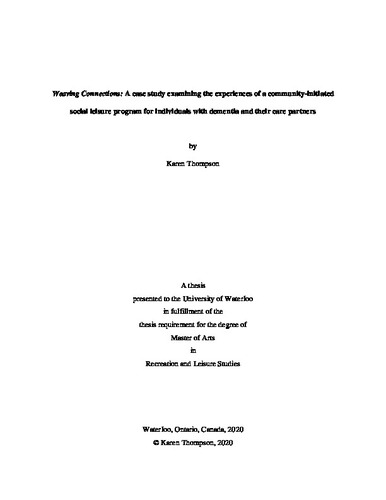| dc.description.abstract | There are currently 564,000 Canadians living with dementia, and this number is anticipated to rise significantly (Alzheimer Society of Canada, 2016). Persons with dementia are amongst the most stigmatized groups in society. Because of this, they are often excluded from social opportunities within their communities, impacting their health, well-being, and quality of life (Dupuis, Wiersma, & Loiselle, 2012c; Greenwood, 2015). Further, few programs exist that include individuals with dementia in decision-making (Dupuis, Gillies, Carson, Whyte, Genoe, Loiselle, & Sadler, 2012a). One exception is the Memory Boosters, a peer-led, community-initiated social leisure opportunity, which is designed by and for care partners and individuals living with dementia. However, very little research has explored peer-led, community leisure programs in the context of dementia. The purpose of this case study is to fill this gap by gaining a comprehensive understanding of a peer-led social leisure program for people with dementia and their family members. Using the Memory Boosters as a unique case, focus groups and active interviews were used to understand the relational aspects of the group, how it differs from other opportunities in the community, and the relational processes in place to sustain the program. Three major themes emerged from this research, including (1) having a place of worth; 2) supporting continued engagement and making meaningful choices; and 3) nurturing interdependent relationships. These foundational themes supported members in creating meaningful experiences and weaving connections. The Memory Boosters can be used as an exemplar to influence social leisure programs for individuals with dementia and their care partners within other communities. | en |

